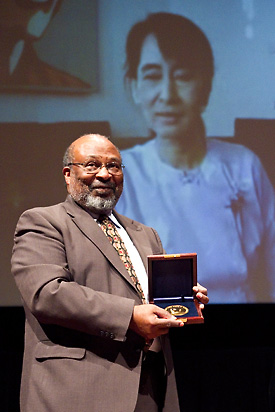Seated in a room that once was her prison cell, Burmese dissident Aung San Suu Kyi chatted with U-M students, dishing out advice, analyzing the Arab Spring, joking about an upcoming Hollywood movie on her life and sharing hopes for democracy in her repressive country.
The rare and lively discussion with the global icon for democracy was held Oct. 25 after Suu Kyi received the Wallenberg Medal. The humanitarian honor is named after a U-M alumnus who saved tens of thousands of Jews near the end of World War II.

Lester Monts, senior vice provost for academic affairs, presents the 21st annual Wallenberg Medal to Aung San Suu Kyi (shown on video screen). She delivered the Wallenberg Lecture by video in Rackham Auditorium. Photo by Daryl Marshke, U-M Photo Services.
Suu Kyi accepted the medal in absentia because of fears that if she leaves Burma, the authoritarian rulers wouldn’t allow her to return to the Southeast Asian nation.
Her Wallenberg Lecture was recorded by video in her living room in Rangoon a few weeks before the event and shown during the ceremony in Rackham Auditorium, packed with students, faculty and community members.
A live question-and-answer session via Skype with Suu Kyi followed the lecture. When her face appeared on the massive screen in the auditorium, the audience stood up and gave her a thunderous round of applause. Suu Kyi smiled as she was shown her Wallenberg Medal.
Four students seated on the stage asked the first couple rounds of questions before taking more from the audience.
It was a unique opportunity to talk to the dissident and Nobel Peace laureate, who has spent most of the past 20 years detained in her home. She was freed nearly a year ago amid signs that a political thaw might be underway in Burma. But such periods of apparent liberalization have ended with renewed crackdowns in the past, so it’s uncertain whether Suu Kyi will remain free much longer.
The Burmese dissident told her U-M audience that the years she spent in detention were worthwhile because they helped focus global attention on her movement. Suu Kyi’s party won elections in 1990, but the military rulers refused to give up power.
She applauded the Arab Spring and the toppling of repressive regimes in the Middle East. But she said it was regretful the changes in Libya did not come peacefully. Violence “leaves wounds that are very difficult to heal,” she said.
“I think in the long run, non violence pays off, but it’s a long road. It’s difficult,” she added.
Suu Kyi said that democratic reforms were inevitable for other countries, such as China. “I myself believe in democracy and I believe human beings want to be free and want to be secure,” she said.
When asked to name some of the most inspiring figures in her life, she first mentioned her mother, who taught her how to be courageous and have a highly developed sense of duty, she said.
She also said she was inspired by Raoul Wallenberg, a 1935 graduate of the U-M College of Architecture. While working as a Swedish diplomat, Wallenberg saved the lives of tens of thousands of Hungarian Jews by issuing them protective passports and hiding them in safe houses.
Suu Kyi said she has been campaigning for a better life for her own people, but what made Wallenberg so heroic is that he risked his life for people of another race and religion.
Some have questioned whether Burma will ever be able to create a true democracy after being mired in oppression and corruption for decades. But Suu Kyi said the American example made her hopeful about Burma’s future.
“Wasn’t there oppression in the United States?” she asked, drawing laughter from the audience. “You can’t pretend there was never such a thing as oppression in the United States and you worked your way out of it.”
She added, “What’s the point of being human if you’re prepared to stay in a pit forever. We’ve got to climb out.”
Suu Kyi’s life story has been made into a Hollywood movie, “The Lady,” which will be released soon and feature former “Bond girl” Michelle Yeoh in the lead role.
“I find it a little embarrassing,” she said. “I have to confess I don’t like the idea of a film made about me. I don’t know what’s in it. I’m not terribly keen on watching the film. Perhaps I never will.”
The discussion with the students made Suu Kyi reflect on her own school years, which she said were some of the best ones in her life. She urged the students to live an active life and try to change the world.
“When I was under house arrest, I used to think of my days as a student, and it would make me happy because we were so full of confidence.”
She added, “Just don’t sit there. You won’t get anywhere if you just sit there.”

